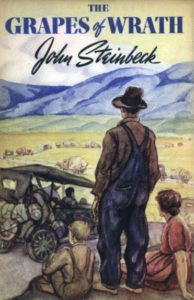Widely renowned as a literary classic, and a great example of American Gothic literature, The Grapes of Wrath is a novel of social fiction written by John Steinbeck and published in 1939: The novel is the most renowned of all his 17 works. Not only did it win him several awards including a Pulitzer Prize (1940) and a National Book Award, it was also mentioned when Steinbeck received the Nobel Prize for literature in 1969. Set during the Great  Depression, the novel focuses on the Joads, a poor family of tenant farmers driven from their Oklahoma home by drought, economic hardship, agricultural industry changes, and bank foreclosures forcing tenant farmers out of work. Due to their nearly hopeless situation, and in part because they are trapped in the Dust Bowl, the Joads set out for California. Along with thousands of other “Okies“, they seek jobs, land, dignity, and a future.
Depression, the novel focuses on the Joads, a poor family of tenant farmers driven from their Oklahoma home by drought, economic hardship, agricultural industry changes, and bank foreclosures forcing tenant farmers out of work. Due to their nearly hopeless situation, and in part because they are trapped in the Dust Bowl, the Joads set out for California. Along with thousands of other “Okies“, they seek jobs, land, dignity, and a future.
Many scholars note Steinbeck for his many uses of Christian imagery within The Grapes of Wrath. The largest implications lie with Tom Joad and Jim Casy, who are both interpreted as Christ-like figures at certain intervals within the novel. These two are often interpreted together, with Jim Casy representing Jesus Christ in the early days of his ministry, up until his death, which is interpreted as representing the death of Christ. From there, Tom takes over, rising in Casy’s place as the Christ figure risen from the dead.

However, the religious imagery is not limited to these two characters. Scholars have regularly inspected other characters and plot points within the novel, including Ma Joad, Rose of Sharon, Rose of Sharon’s stillborn child, and Uncle John. In an article first published in 2009, Ken Eckert even compared the migrant’s movement west as a reversed version of the slaves’ escape from Egypt in Exodus. Many of these extreme interpretations are brought on by Steinbeck’s own documented beliefs, which Eckert himself refers to as “unorthodox”.
While writing the novel at his home, 16250 Greenwood Lane, in what is now Monte Sereno, California, Steinbeck had unusual difficulty devising a title. The Grapes of Wrath, suggested by his wife Carol Steinbeck, was deemed more suitable than anything by the author. The title is a reference to lyrics from “The Battle Hymn of the Republic“, by Julia Ward Howe:
Mine eyes have seen the glory of the coming of the Lord:
He is trampling out the vintage where the grapes of wrath are stored;
He hath loosed the fateful lightning of His terrible swift sword:
His truth is marching on.
A celebrated Hollywood film version, starring Henry Fonda and directed by John Ford, was released in 1940. John Steinbeck died on December 20th1968 at the age of 66. Novels such as The Grapes of Wrath, Of Mice and Men and East of Eden made him world famous.





